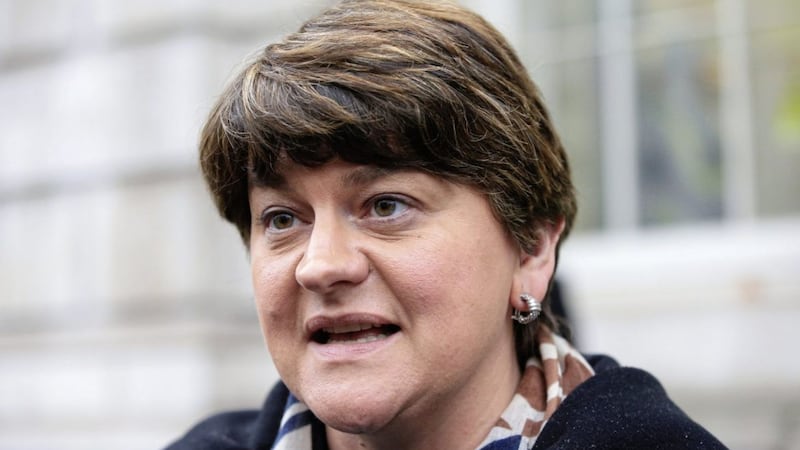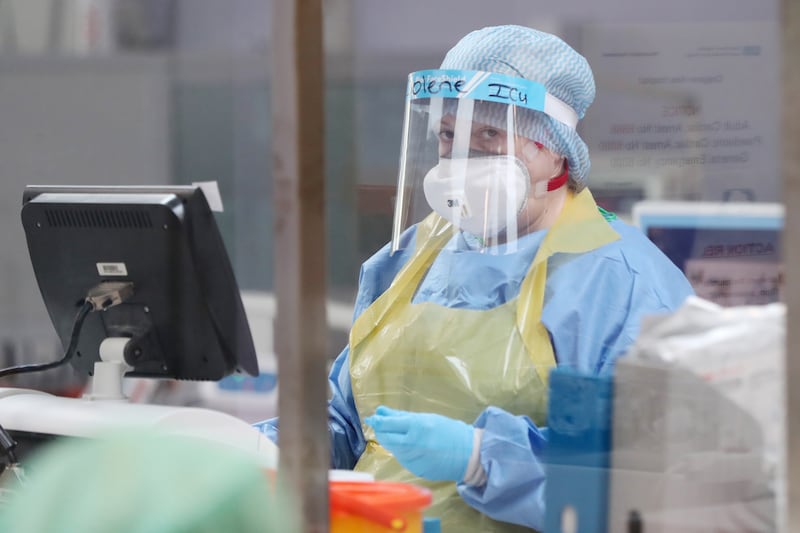First Minister Arlene Foster has said she is not worried about an interview DUP assembly member Jonathan Bell is set to give tonight in which he has said he will tell "the truth" about the Renewable Heating Incentive.
Ms Foster accused Jonathan Bell of stepping outside party lines and said DUP officials would take action.
"I am very much looking forward to the truth coming out because I have absolutely nothing to hide," she said.
In a remarkable intervention, a tearful Mr Bell said his claims would spell the end of his political career, but said he had to do his duty to Northern Ireland by lifting the lid on a furore that had left the taxpayer facing a bill of an estimated £400 million.
He said "documents, emails, times, dates" showed that hundreds of millions of pounds were "abused". Mr Bell has given an interview to the BBC, which will outline his allegations in full at 10.40pm on Thursday.
"My political career is finished, you are going to be ruined for telling the truth," Mr Bell told the Nolan Show.
"I have had to do one of the most difficult things I have had to do in my life ... and tell the public of Northern Ireland the truth, to shine a light onto what has occurred and to deal with a major problem."
Mr Bell was in charge of the department dealing with the failed green energy scheme during a spike in applications and the Irish News has learned that the DUP's 2015 in-out policy led him to delay introducing curbs.
Mrs Foster has faced down calls to resign for her role in the Renewable Heat Incentive (RHI), which was developed during her time as economy minister. She is set to come under further scrutiny on Monday when the assembly is recalled for a special sitting to debate the green energy scandal.
The Public Accounts Committee invited First Minster Arlene Foster to appear before it as part of its probe into the scandal. An unwritten convention could have seen the First Minister escape a grilling by Stormont's public spending watchdog because normally officials hauled in to explain the detail behind decisions.
At a meeting on Thursday, the committee voted to invite the first minister. Members said there were a number of questions the first minister needed to address.
Chairperson of the Committee Robin Swann MLA said: “While it is not the convention to invite Ministers to come before the Committee and give evidence, the majority of the Committee feels that in this case it would be both appropriate and desirable.
Ms Foster has promised to meet with the watchdog, if an invitation was made.
The Committee has also agreed to invite Mr Bell, Sammy Wilson, the former Minister for Finance and Personnel and Patsy McGlone MLA, former Chairperson of the Committee for Enterprise, Trade and Investment, with regards their roles and responsibilities in relation to the RHI Scheme.
Flaws in the £1.2 billion renewables scheme mean a £400m hole could be burned in the Stormont executive's budget over the next 20 years. Mrs Foster has refused to accept responsibility for the RHI's failings, telling The Irish News in October that ministers could not be across "every jot and tittle" of policy.
An initiative that was supposed to help businesses mitigate the costs of running eco-friendly boilers actually ended up paying out more than the cost of the fuel - so the more people burned, the more public money they earned. There are claims some applicants to the scheme were in line to pocket £1 million over 20 years for heating empty sheds.
Mr Bell was Mrs Foster's successor as economy minister. He was subsequently replaced in the role after May's Assembly election.
In an interview with the Impartial Reporter, a local newspaper in her Fermanagh and South Tyrone constituency, the First Minister said she would lay out the "facts" around the scheme on Monday, during a specially recalled sitting of the devolved Assembly.
"Unfortunately to date there has been 10% fact and 90% spin in relation to this story, so it's important the facts get out there and I am looking forward to doing that on Monday," she said.
Reacting to Mr Bell's remarks, she said: "I think he has stepped outside of the party lines, he has not communicated with me in any way recently, so it'll be a matter now for party officers as to which action they take."
Strangford MLA Mr Bell referenced his late party leader Dr Ian Paisley when explaining his decision to "tell the truth".
"People tell me if you step outside the box, if you put your head above the parapet, it will be shot off," he said.
"I believe that God doesn't punish people who tell the truth, so let's see how it plays out. My only aim is that the truth is told, I have now told it."
Mr Bell said his wife urged him to reveal what he knew about the RHI.
"This is difficult because hospitals in Northern Ireland will not be built," he said.
"There is a ward in the Ulster Hospital (which) is closed. Do you think I can sit back and not tell the truth, not when God has told me to tell the truth?
"Dr Paisley was right - 'Tell the truth should the heavens fall on you'.
The RHI aimed to cut the cost of green energy to encourage people to move off fossil fuels, but ended up landing ministers with a massive overspend.
It incentivised the installation of costly eco-friendly heating systems by paying a tariff per kilowatt of heat burned over a 20-year period.
But, unlike in the rest of the UK, in Northern Ireland no cap or payment tier system was placed on the money that could be claimed in proportion to the size of boiler and the hours it was operated.
That resulted in the RHI tariff paid out being higher than the cost of fuel needed to run the boilers.
Thousands signed up to the RHI - a deluge that ultimately forced its closure, but not before Stormont had been left with a huge future bill.
Overall, more than £1 billion of public money will be paid by 2036 to Northern Ireland-based businesses which signed up to the scheme. Around £400 million of that will be paid out by the Stormont Executive.
One of the main criticisms facing the First Minister is an accusation she did not do enough to pursue whistleblower allegations that sought to expose flaws in the system - something she has vehemently denied.







